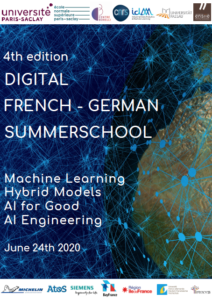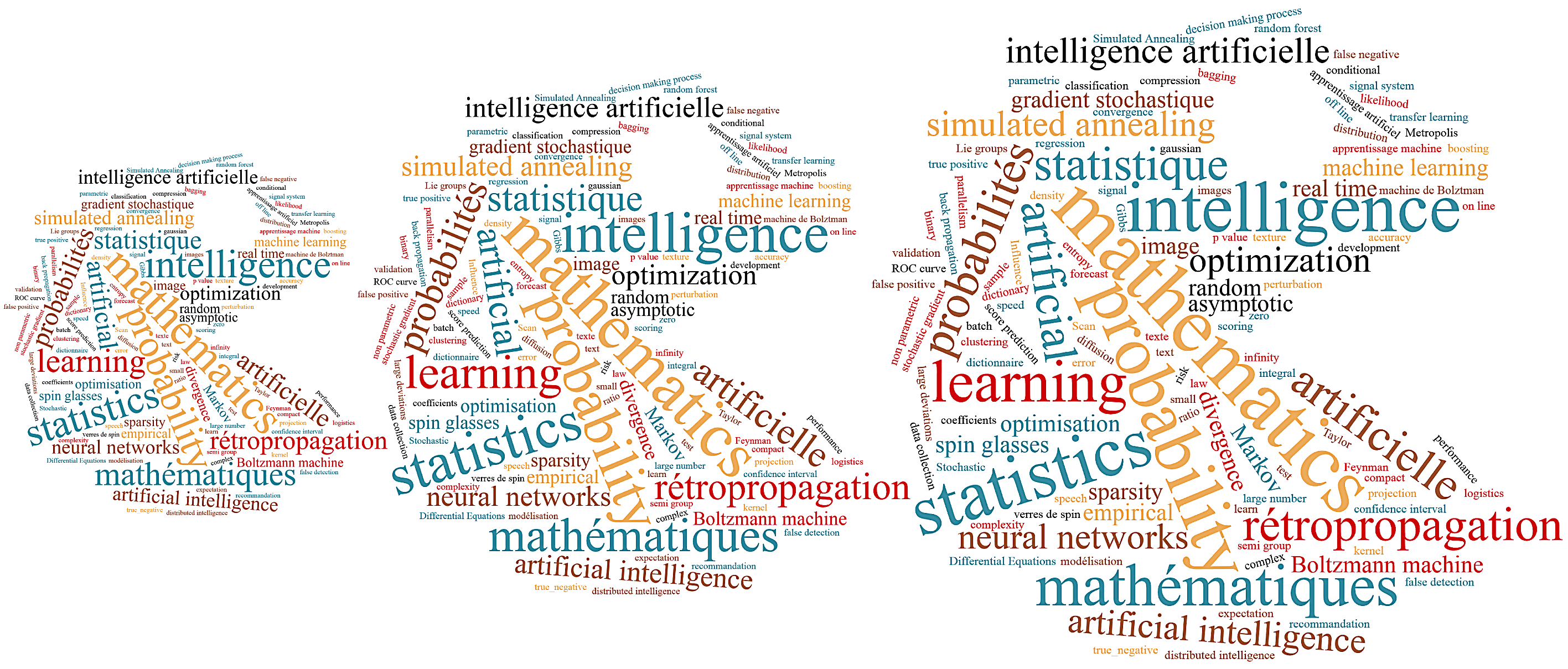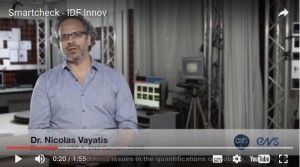Check out our new page dedicated to research results and resources on the COVID-19 epidemic.
All posts by Argyris
Digital French-German Summer School with Industry 2020
Machine Learning – AI Engineering- AI for the Good
Wednesday 24 June 2020 – 100% online!
Registration is free but mandatory before the event (link to the registration). Once registered, you will receive by mail a link to the live session on the pdf ticket. For technical reason, only the first 200 registrations will have access to the online session.
Quick links to sessions:
Messages from VIPs (afternoon – 12:15-13.15)
Live plenary session (afternoon – 13.00-17.30)
Short scientific presentations (morning-12.15)
PROGRAM
Morning free watching of short scientific presentations
Contributions from:
-
- industrial partners… on how they relate to the Summer School’s topics.
- academia and research… on scientific topics.
- policy partners… on the French-German cooperation.
Full list of scientific videos from academic researchers & industrial entities:
-
- Mounir Atiq, Genetic algorithm for budget learning on random forests using genome reduction techniques, Tarkett & Centre Borelli, ENS Paris-Saclay.
- Stephen Becher, Establishing privacy preferences – enabling sustainable personal research data, University of Passau.
- Alejandro de la Concha, Offline detection of change-points in the mean for stationary graph signals, Centre Borelli, ENS Paris-Saclay.
- Antoine de Mathelin, Transfer Learning for Design Space Exploration. Application to industrial product design, Michelin & Centre Borelli, ENS Paris-Saclay.
- Nestor Demeure, AI augmented linear solvers: using machine learning to predict the convergence profile of a linear solver, CEA & Centre Borelli, ENS Paris-Saclay.
- Mathilde Fekom, Sequential control of network processes, Centre Borelli, ENS Paris-Saclay.
- Kanishka Gosh Dastidar, Nag: Neural Aggregate Generation Framework, University of Passau.
- Sothea Has, A clusterwise supervised learning procedure based on aggregation of distances. Applications on modeling energy data, LPSM Université de Paris.
- Pierre Humbert, Low rank activations for tensor-based convolutional sparse coding, Centre Borelli, ENS Paris-Saclay
- Dietmar Jakob, Impact of Voice User Interfaces on Elderly Residential Environment, University of Passau.
- Argyris Kalogeratos, Winning the competition: enhancing counter-contagion in behavioral epidemic processes, Centre Borelli, ENS Paris-Saclay.
- Paul Lachat, Detection and prevention of inference attacks linked to sensor data in Edge Computing Environment, INSA, France & University of Passau.
- Alfred Laugros, Evaluating Robustness of Neural Networks to Common Corruptions, Atos.
- Batiste Le Bars, Change-point detection in a time-varying Ising model, SigFox & Centre Borelli, ENS Paris-Saclay.
- Anthea Mérida, Model pre-selection method using Neural Decision Trees, Centre Borelli, ENS Paris-Saclay.
- Baptiste Metge, Emeric Dynomant, Miguel Garcia, Jonathan Grienay, Covid-19 research mining, Atos.
- Ludovic Minvielle, Step detection with convolutional models, Tarkett & Centre Borelli, ENS Paris-Saclay.
- Eric Monchalin, Reinvent our future with the magic of AI, Atos.
- Matthieu Ospici, Domain adaptation for person re-identification, Atos.
- Loic Pauletto, Searching for optimal deep neural architecture, Atos.
- Marc Platini, Root cause analysis based on deep learning for HPC predictive maintenance, Atos.
- Guillaume Richard, Unsupervised multi-source domain adaptation for regression, EDF & Centre Borelli, ENS Paris-Saclay.
- Théo Saillant, Weighting method for online estimators applied to HPC job power consumption estimation from submission data, CEA & Centre Borelli, ENS Paris-Saclay.
- Brian Tervil, A beta version of ONADAP, a visualization and decision support platform for hospital facilities in times of sanitary crisis, Centre Borelli, ENS Paris-Saclay.
- Charles Truong, Recent advances in change point detection, Centre Borelli, ENS Paris-Saclay
- Sebastian Wilhelm, Activity Monitoring reusing Home Infrastructure Data, University of Passau.
Afternoon live plenary session
12:15-13.15 Messages from VIPs
-
- Juha Heikkilä, Head of Unit Robotics and Artificial Intelligence, European Commission.
- Juliette Jarry, Vice-President of Région Auvergne Rhone Alpes in charge of Digitalisation.
- Lionel Grotto, Directeur Général de Choose Paris Region, Région Ile de France.
- Marco Alexander Breit, Head of Department Artificial Intelligence at the Bundesministerium für Wirtschaft und Energie.
- Dr. Michael Jaspers, Scientific Advisor of the German Embassy in Paris.
- Prof. Hervé Martin, Scientific Advisor of the French Consulate in Bavaria.
- Prof. Philippe Gréciano, Vice-President of the Deutsch-Französische Hochschule DFH-UFA.
- Prof. Pascal Auscher, Director of the National Institute of Mathematics and their Interactions, CNRS.
- Prof. Pierre-Paul Zalio, President of Ecole Normale Supérieure Paris-Saclay.
- Prof. Ulrich Bartosch, President of Universität Passau.
- Laurent Prével, Director of Ecole Nationale Supérieure d’Informatique pour l’Industrie et l’Entreprise.
- Philippe Mareine, Senior Executive Vice President, Head of Group Human Resources, CSR, Chief Digital & Transformation Officer.
- Dr. Natascha Eckert, Head of SIEMENS University Relations.
- Dr. Eric Monchalin, Vice-President, Head of Machine Intelligence at Atos.
13.00-13.15 Register & join the virtual plenary session
13.15-13.50 Official opening & group photo
-
- Welcome by the organizers – Prof. Mathilde Mougeot, ENS Paris Saclay & ENSIIE, Prof. Harald Kosch & Axelle Cheney, both Passau University, Dr. Ullli Waltinger & Benno Blumoser, both Siemens AI Lab.
- Official opening – Dr. Bernd Forster/ Michael HIinterdobler, Bayerische Staatskanzlei, Germany and by Hubert Tardieu, ATOS CEO Adviser, France,
13.50 – 14.50 Session 1 – Machine Learning (chaired by ENS Paris-Saclay)
-
-
- Live presentation by Dr. Francois Deheeger, Michelin Lead Data Scientist, France. Hybrid model in product design. slides.
- Live presentation by Dr. Fikri Hafid, Réseau de Transport d’Electricité Head of R&D Studies, France. Machine learning use cases at a transmission system operator. slides.
- Live presentation by Prof. Michael Granitzer, Passau University Professor for Data Science, Germany. Machine Learning Engineerging and Sustainability. slides.
- Q&A on the 3 presentations and panel discussion.
-
14.50-15.00 Active Break (Stretching)
15.00-16.15 Session 2 – AI for the Good (chaired by Siemens)
-
- Live presentation by Benno Blumoser, Siemens AI Lab Munich, Germany. AI for the Good – a Corporate View.
- Live presentation by Dr. Brian Tervil, CNRS research scientist, Borelli center, ENS Paris-Saclay, France. ONADAP – a visualization and decision support tool for dynamic human and material ressources allocation within hospital facilities in times of sanitary crisis. slides.
- Live presentation by Valentin KRUSPEL, Deutsche Gesellschaft für Internationale Zusammenarbeit (GIZ),Germany. Data Powered Positive Deviance and Beyond – Using AI for Sustainable International Development.
- Live presentation by Julia Gottfriedsen, German Aero-Space Center (DLR) Environmental Data Science Researcher, Germany. Using Data Analytics and Machine Learning to Control Wildfire.
- Q&A on the 4 presentations and panel discussion.
16.15-16.20 Passive Break (get yourself a coffee before the final part)
16.20 – 17.20 Session 3 – AI Engineering (chaired by Passau University)
-
- Live presentation by Prof. Gianluca Bontempi, Université Libre de Bruxelles Professor and Co-Head at Machine Learning Group, Belgium. Causality and big data analytics: risks, challenges and solutions. slides and documents.
- Live presentation by Matthias Laporte, Inspector at Banque de France, France. Self organizing maps for anomaly detection in an operational context. slides.
- Live presentation by Tobias Bürger, BMW Lead Big Data and AI Platform, Germany. Machine Learning and AI in Practice – Insights into use cases from the BMW Group.
- Q&A on the 3 presentations and panel discussion.
17.20 – 17.30 Wrap-up and Closing
Organizers
ENS Paris-Saclay, France, Prof. M. Mougeot (& ENSIIE) , Dr. A. Kalogeratos, Dr. C. Truong,
University of Passau, Germany: A. Cheney, Prof. H. Kosch,
Siemens AI Lab, Germany: Dr. U. Walltinger, Dr. B. Blumoser.
#DFGSS2020
https://twitter.com/mlmda_group
Éléments de mathématique pour l’IA
Éléments de mathématique pour l’Intelligence artificielle
Précurseur de l’intelligence artificielle en France, Robert Azencott (Houston Univ.) répond à l’invitation de ses anciens étudiants de Cachan pour une série de conférences autour des mathématiques qu’il n’a cessé de développer et d’appliquer avec passion : théorie des grandes déviations, traitement d’images, apprentissage statistique. En savoir plus…
Album photos…
Conférence en l’honneur de Robert Azencott
14-15 mai 2019, ENS Paris-Saclay, Cachan
61 avenue du président Wilson, 94230 Cachan,
bâtiment d’Alembert – amphi Curie – Plan d’accès & Campus map
- mardi 14 mai 9:30 – 12:30
– Lucien BIRGÉ, Paris Sorbonne University, 9h30-10h30.
Some attempts toward the construction of a “universal” estimator.
– Olivier CATONI, CREST, 10h30-11h10.
Statistical syntax models.
– coffee break, 11h10-11h50.
– Gilles BLANCHARD, IHES, Postdam University, 11h50-12h30.
Construction of tight wavelet-like frames on graphs (joint work with Franziska Göbel and Ulrike von Luxburg).
12:30-14:00 – Déjeuner – Lunch break (Hall Villon)
- mardi 14 mai 14:00-18:00
– Jean-Michel MOREL, CMLA, ENS Paris-Saclay, 14h00-14h40.
Une énigme de la perception: la détection d’anomalies (travaux communs avec Axel Davy, Mauricio Delbracio, et Thibaud Ehret).
– Stéphanie ALLASSONNIÈRE, Paris Descartes University, 14h40-15h20.
Les algorithmes de type EM : puissance et versatilité.
– Andreas MANG, Houston University, 12h50-12h30.
Diffeomorphic shape matching: Fast algorithms for non-linear optimal control problems (joint work with R. Azencott, George Biros, Jiwen He et al.).
coffee break 16h-16h40
– TABLE RONDE animée par Charles-Albert Lehalle et Alain Trouvé,16h40-18h00 : Intelligence Artificielle, mathématiques et industrie. Bruno Durand (Renault) ; Oussama Chérif (Fivegroups) ; Stéphane Herbin (Onera) ; Anne-Sophie Taillandier (Teralab)
18:00 – Closing ceremony & Pictures
Intervention de Robert AZENCOTT, Houston University.
Discours de Pierre-Paul ZALIO, ENS Paris -Saclay
19:30-23:00 – Cocktail dinatoire – Conference dinner
Bâtiment d’Alembert – hall Villon
- mercredi 15 mai 10:00 – 12:30
– Gérard BEN AROUS, Courant Institute, NYU Shanghai, 10h00-10h40.
Sur les traces de Robert Azencott : des verres de spins aux Data Sciences.
– Chloé-Agathe AZENCOTT, Mines ParisTech, Institut Curie, 10h40-11h20.
Variable selection in high-dimensional data for precision medicine.
– coffee break 11h20-11h50
– Laurent YOUNES, Johns Hopkins University, 11h50-12h30.
Espaces de formes et applications.
12:30-14:00 – Déjeuner – Lunch break (CROUS restaurant)
- mercredi 15 mai 14:00 – 17:10
– Pierre ALQUIER, ENSAE ParisTech, 14h00-14h40.
Generalization bounds for online variational inference (joint work with James Ridgway, Badr-Eddine Chérief-Abdellatif and Mohammad Emtiyaz Kahn).
– Ilaria GIULINI, Paris Diderot University, 14h40-15h20.
Kernel Spectral Clustering.
– coffee break 15h20-15h50
– Jean-Philippe VERT, Google Brain and MINES ParisTech 15h50-16h.
– Nicolas VAYATIS, CMLA, ENS Paris-Saclay, 16h00-16h40.
20 ans de Machine Learning.
– Conclusion of the conference 16h30-16h40
Invited Speakers Biography & Abstracts
Participation gratuite. Inscriptions closes. Contacter le secrétariat du CMLA.
Organisateurs:
Mathilde MOUGEOT, ENSIIE, ENS Paris-Saclay.
Charles-Albert LEHALLE, CFM, Imperial College.
Alain TROUVÉ, CMLA, ENS Paris-Saclay.
Nicolas VAYATIS, CMLA, ENS Paris-Saclay.
Laurent YOUNES, Johns Hopkins Univ.
La chaire Industrial Data Analytics & Machine Learning regroupe les partenaires Atos, le CEA, Bertin IT, Michelin, la SNCF ainsi que l’ENS Paris-Saclay et l’ENSIIE.
Robert Azencott : retour vers le futur à Cachan
![]() Robert Azencott, actuellement en poste à l’université de Houston au Texas, est un chercheur français dont l’empreinte dans le paysage des mathématiques appliquées françaises est considérable. Ancien élève de l’ENS Paris, Robert Azencott quittera ses premières amours, la géométrie algébrique, pour se tourner vers la théorie des probabilités et la théorie des grandes déviations, avant de s’enthousiasmer pour la compréhension et l’étude des potentialités de l’intelligence distribuée, à l’époque où les réseaux de neurones commencent à peine à émerger.
Robert Azencott, actuellement en poste à l’université de Houston au Texas, est un chercheur français dont l’empreinte dans le paysage des mathématiques appliquées françaises est considérable. Ancien élève de l’ENS Paris, Robert Azencott quittera ses premières amours, la géométrie algébrique, pour se tourner vers la théorie des probabilités et la théorie des grandes déviations, avant de s’enthousiasmer pour la compréhension et l’étude des potentialités de l’intelligence distribuée, à l’époque où les réseaux de neurones commencent à peine à émerger.
Il comprend alors la nécessité de développer un programme d’avant-garde comprenant : un volet recherche académique avec le développement vigoureux de l’équipe DIAM (Distributed Intelligence and Applied Maths) au sein de l’université Paris-Sud, puis de l’ENS de Cachan, ainsi que du groupement de recherche (GDR) « Mathématiques des systèmes perceptifs et cognitifs » ; un volet enseignement avec la création du master MIA (devenu vingt ans plus tard l’incontournable Master MVA : Mathématiques, vision, apprentissage) ; et un volet R&D d’applications à l’industrie avec la création de plusieurs start-up dont Miriad Technologies, autour de solutions à base d’algorithmes d’apprentissage.
La mathématique pour le développement de solutions algorithmiques auto-apprenantes à partir de données a connu un développement exceptionnel ces dernières années, et a révolutionné le domaine de l’Intelligence artificielle. Robert Azencott a été et reste un acteur majeur de cette évolution.
Aujourd’hui, ses anciens étudiants en France ont souhaité témoigner de son caractère visionnaire en organisant la conférence internationale « Éléments de mathématique pour l’Intelligence artificielle » en son honneur. Cette conférence rassemble sur deux jours des communications de chercheurs travaillant dans les champs des mathématiques auxquels Robert Azencott a contribué et contribue encore aujourd’hui de manière significative : la théorie des grandes déviations, le traitement d’images, et l’apprentissage statistique.
Les deux journées, organisées les 14 et 15 mai 2019 à l’ENS Paris-Saclay, proposent des sessions thématiques d’exposés scientifiques et une table ronde rassemblant des chercheurs en mathématiques qui contribuent aujourd’hui activement au développement de solutions innovantes à base de mathématiques dans l’industrie.
Lire aussi :
Les débuts de l’aventure française de l’intelligence artificielle
Data Analytics Post || 2018.07.26
MLMDA matters…
Clinical trials with SmartCheck
Description of SmartCheck
SmartCheck is a solution for assessment of posture during clinical evaluations..






